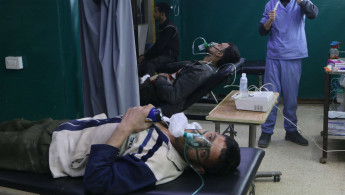OPCW probing 'several' chemical attacks in Syria's Ghouta
The Organisation for the Prohibition of Chemical Weapons (OPCW) has received several allegations of chemical weapons use in Syria's Eastern Ghouta enclave but a thorough investigation of these claims will be difficult, the head of the organisation said on Tuesday.
A fact-finding mission set up by the watchdog had so far investigated more than 70 cases of toxic gas attacks in Syria since 2014, out of a total of 370 allegations, said Ahmet Uzumcu.
"There have been several" allegations of chemical weapons use in Eastern Ghouta, Uzumcu told reporters ahead of a closed-door meeting with the Security Council on the use of the banned agents in Syria.
"Our experts are looking at them, but clearly since this is an enclave, it's very difficult to have access to information and material," said the OPCW's director general.
The Syrian Observatory of Human Rights has said that chlorine was used as a toxic agent on villages during the government's offensive to retake rebel-held Eastern Ghouta.
Russian Ambassador Vassily Nebenzia told reporters that Syrian forces had found stockpiles of chemical weapons in areas formerly held by rebels in Eastern Ghouta.
"What worries us is that in areas liberated from the rebels, the Syrian government discovered stockpiles of chemical weapons ready for use and that is very worrying," said Nebenzia.
Uzumcu said the experts were looking into allegations of chlorine use that were attributed to the Syrian army and to rebel groups.
The OPCW's fact-finding mission for Syria was established in April 2014 to determine whether toxic agents were used as a weapon, but it does not have the mandate to establish who is responsible for its use.
The Security Council in 2015 set up a panel to determine who was behind the attacks but that inquiry ended last year when Russia vetoed the extension of its mandate.
Russia maintained that the panel, known as the Joint Investigative Mechanism (JIM), was biased and unprofessional after it concluded in a report that Syrian government forces had used sarin in an attack on the rebel-held town of Khan Sheikhoun in April last year.
Under a 2013 deal negotiated by the United States and Russia, Syria agreed to destroy all of its chemical weapons, but there have been questions about its declared stockpile.
UN Secretary-General Antonio Guterres told the council in a letter this month that there were "remaining gaps, inconsistencies and discrepancies" in the Syrian government's disclosure of its chemical program.





 Follow the Middle East's top stories in English at The New Arab on Google News
Follow the Middle East's top stories in English at The New Arab on Google News
![The UAE is widely suspected of arming the RSF militia [Getty]](/sites/default/files/styles/image_330x185/public/2024-11/GettyImages-472529908.jpg?h=69f2b9d0&itok=Yauw3YTG)
![Netanyahu furiously denounced the ICC [Getty]](/sites/default/files/styles/image_330x185/public/2024-11/GettyImages-2169352575.jpg?h=199d8c1f&itok=-vRiruf5)
![Both Hamas and the Palestinian Authority welcomed the ICC arrest warrants [Getty]](/sites/default/files/styles/image_330x185/public/2024-11/GettyImages-2178351173.jpg?h=199d8c1f&itok=TV858iVg)